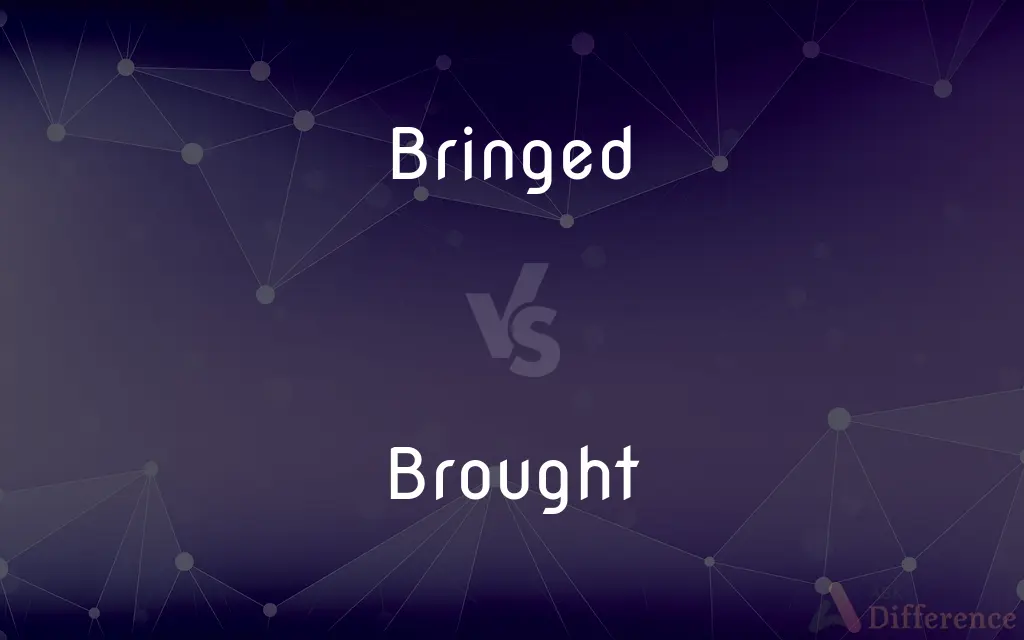Bringed vs. Brought — Which is Correct Spelling?
Edited by Tayyaba Rehman — By Fiza Rafique — Updated on March 22, 2024
"Bringed" is a common misspelling. The correct past tense of "bring" is "brought," denoting the action of having carried or transported something.

Table of Contents
Which is correct: Bringed or Brought
How to spell Brought?

Bringed
Incorrect Spelling

Brought
Correct Spelling
ADVERTISEMENT
Key Differences
Remember "ing" in "bring" drops and gets replaced with "ought."
Visualize the phrase "I brought it" to reinforce the correct form.
Note that English irregular verbs often have unique past tense forms.
Associate "brought" with "thought" since both end in "ought."
Say it aloud: "brought" sounds correct, while "bringed" sounds off.
ADVERTISEMENT
How Do You Spell Brought Correctly?
Incorrect: She bringed her friends to the party last night.
Correct: She brought her friends to the party last night.
Incorrect: I have never bringed up that subject before.
Correct: I have never brought up that subject before.
Incorrect: He has bringed great ideas to the team.
Correct: He has brought great ideas to the team.
Incorrect: Yesterday, he bringed his book to class.
Correct: Yesterday, he brought his book to class.
Incorrect: They bringed their own food to the picnic.
Correct: They brought their own food to the picnic.
Brought Definitions
Introduced or initiated an action or situation.
The news brought joy to the family.
Caused or resulted in a particular situation.
The storm brought chaos to the city.
Past tense of "bring," meaning to carry something to a place.
He brought the groceries inside.
Presented or put forward a proposal or motion.
She brought a new idea to the meeting.
Led someone to a particular destination or state.
The guide brought us to the mountaintop.
Past tense and past participle of bring.
Simple past tense and past participle of bring
Brought Meaning in a Sentence
She brought her expertise to the new project.
He brought his camera to capture the moment.
They brought their children to the zoo for the first time.
The movie brought tears to my eyes.
The seminar brought together experts from around the world.
She brought her homemade cookies to the office.
His joke brought laughter to the otherwise silent room.
His leadership brought the team to victory.
The news brought joy to everyone in the room.
The storm brought heavy rain and strong winds.
The festival brought the community closer together.
The negotiation brought an end to the conflict.
The reunion brought old friends back together.
The chef brought new flavors to traditional dishes.
The play brought the audience to a standing ovation.
The novel brought the historical period to life.
The therapy sessions brought him a sense of peace.
The celebration brought the whole family joy.
The policy change brought relief to many people.
The gift brought a smile to her face.
The charity event brought in a lot of donations.
The lecture brought new insights into the subject.
The documentary brought attention to important issues.
The competition brought out the best in the participants.
The discovery brought about a major breakthrough.
Brought Idioms & Phrases
Brought to bear
Applied or exerted.
All resources were brought to bear to tackle the crisis.
Brought to a standstill
Made to stop completely.
The snowstorm brought the city to a standstill.
Brought to the table
Offered or contributed.
He brought a lot of experience to the table.
Brought to justice
Arrested or made to face legal consequences.
The criminal was finally brought to justice.
Brought to one's knees
Defeated or overwhelmed.
The empire was brought to its knees by the invaders.
Brought to light
Revealed or made known.
The investigation brought to light new evidence.
Brought into the fold
Included in a group.
New members were warmly brought into the fold.
Brought into question
Made doubtful.
His actions brought his integrity into question.
Brought into play
Made to be a part of something.
New technology was brought into play to improve efficiency.
Brought to the forefront
Made the most important or visible.
The issue was brought to the forefront during the debate.
Brought home the bacon
Earned a living.
She worked hard to bring home the bacon for her family.
Brought into the open
Revealed or exposed.
The debate brought their true feelings into the open.
Brought to bear upon
Applied or used on something.
Pressure was brought to bear upon the negotiations.
Brought to a close
Ended.
The ceremony was brought to a close with a musical performance.
Brought up to speed
Made aware of or updated.
The manager brought the new employee up to speed.
Brought down to earth
Made to be realistic.
His first job out of college brought him down to earth.
Brought out the best
Made someone show their best qualities.
The challenge brought out the best in the team.
Brought into line
Made to conform.
The new policies brought everyone into line with the company's goals.
Brought under control
Managed or contained.
The fire was quickly brought under control by the firefighters.
Brought to one's attention
Made aware of.
The problem was brought to our attention early on.
Common Curiosities
Why is it called Brought?
"Brought" is the past tense of the verb "bring."
Which vowel is used before Brought?
There isn't a specific vowel that is always used before "brought."
What is the pronunciation of Brought?
Brawt.
What is the verb form of Brought?
"Brought" is the past tense form of the verb "bring."
What is the root word of Brought?
The root word is "bring."
What is the singular form of Brought?
"Brought" itself is not pluralized; it's the past tense of "bring."
Which conjunction is used with Brought?
No specific conjunction is tied exclusively to "brought."
Which preposition is used with Brought?
Prepositions like "to," "into," "from," etc., can be used depending on context.
Is the word Brought imperative?
No.
Is Brought an adverb?
No.
Is Brought a collective noun?
No.
How many syllables are in Brought?
One.
Which article is used with Brought?
Both "a" and "the" can be used, depending on context.
Is Brought a negative or positive word?
Neutral.
Is Brought a countable noun?
"Brought" is not a noun.
Is the Brought term a metaphor?
Not inherently, but can be used metaphorically.
How do we divide Brought into syllables?
Brought is one syllable and isn't divided.
Which determiner is used with Brought?
It depends on the context, but determiners such as "the," "this," or "that" can be used.
What is a stressed syllable in Brought?
The entire word, as it's monosyllabic.
What is the opposite of Brought?
Took away or left.
What is the first form of Brought?
Bring.
What is the second form of Brought?
Brought.
How is Brought used in a sentence?
She brought her favorite book to the meeting.
Is Brought a noun or adjective?
Neither. "Brought" is a verb.
Is Brought an abstract noun?
No.
Is Brought a vowel or consonant?
"Brought" is a word containing both vowels and consonants.
Is the word Brought a gerund?
No.
Is the word “Brought” a Direct object or an Indirect object?
It can be neither, as it's a verb. The object of "brought" could be either direct or indirect, depending on the sentence.
What part of speech is Brought?
Verb.
What is another term for Brought?
Delivered (in certain contexts).
What is the third form of Brought?
Brought.
Share Your Discovery

Previous Comparison
Barracouta vs. Barracuda
Next Comparison
Colander vs. CullenderAuthor Spotlight
Written by
Fiza RafiqueFiza Rafique is a skilled content writer at AskDifference.com, where she meticulously refines and enhances written pieces. Drawing from her vast editorial expertise, Fiza ensures clarity, accuracy, and precision in every article. Passionate about language, she continually seeks to elevate the quality of content for readers worldwide.
Edited by
Tayyaba RehmanTayyaba Rehman is a distinguished writer, currently serving as a primary contributor to askdifference.com. As a researcher in semantics and etymology, Tayyaba's passion for the complexity of languages and their distinctions has found a perfect home on the platform. Tayyaba delves into the intricacies of language, distinguishing between commonly confused words and phrases, thereby providing clarity for readers worldwide.













































